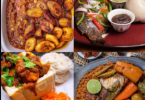Being a beginner attempting to explore how to cook Nigerian dishes may present a bit of a challenge. You may have to contend with a vast collection of ingredients and spices. But not to worry. With a simple guide to follow, you can navigate through these ingredients and master the art of Nigerian cuisine.
There are typical cross-cultural Nigerian dishes and food methods you should get used to. But first you need to familiarize yourself with basic food staples and spices available in Nigeria.
Know the Standard Nigerian Staple Foods
Nigeria has quite a number of staple foods that are grown and eaten in this part if the world. They form the bulk of foods we eat on a regular basis. These include yam, cassava, beans, rice, maize, potatoes, and groundnuts. Grains and legumes such as soya beans, millet, sorghum and guinea corm are also fairly common.
There are also a fair collection of vegetables available. They include several species of spinach, jute (ewedu), bitter leaf, water leaf, pumpkin leaves (Ugwu), Uziza and Basil, amongst others.
Stock Up Your Kitchen: Nigerian Herbs, Spices, Seasoning and Oil
There are loads of aromatic and strong-flavored herbs and spices that add zest to Nigerian cuisine. You will need to familiarize yourself with them. Not only that – buy them from local stores and markets; and have them well stored in your kitchen.
Perishables such as tomatoes, peppers, onions, fresh garlic and ginger, along with leafy vegetables are best kept in the fridge. In the absence of a refrigerator, ensure you buy and use them while still fresh. Finding a means to properly dry the skin of your onions in open air will preserve it longer.
But herbs and spices can be bought and stored ready in clean, airtight containers. Common spices in Nigeria include dried and fresh ginger, garlic, thyme, turmeric, cumin, curry, Yaji, mixed peppersoup spices and several other native spices.
Besides the common factory-packaged stock cubes and seasoning available in the market, there are also native ones you should buy and preserve. They include locust beans (Iru or Ogiri), Uyayak, Uziza leaves, and crayfish for flavor
And of course palm oil is practically an indispensable cooking oil in Nigeria. Most soups and stews require palm oil. So buy it and have it kept away in clean containers.
Get Basic Kitchen Tools Together
Whenever you want to embark on cooking any Nigerian cuisine, don’t be caught lacking the basic utensils. You should have standard cooking utensils and kitchen tools ready within your reach.
The iconic portable pestle and mortar, grater, wooden spoons, spatula, sharp knife(s), cooking spoons, sieve, and cutting board should be within your reach. Also ensure you have various sizes of pots, frying pan, washing bowls, and a food blender/grinder/processor close by.
Get Used to Frying Food
Frying is one of the commonest food preparation techniques in Nigeria. It is often done with vegetable oil. You will often need to fry any one of akara, meat, fish, eggs, potatoes, yams, plantain and the like.
You must get the temperature of the oil just right. It must neither be too hot (to avoid burning) nor too low in temperature (to avoid greasiness) when you immerse the food. The food will come out well browned and crisp on the outside without getting blackened. As well, learn to fry pieces of food in small batches.
Start Out With Simple Recipes
Nigerian cuisine includes a host of common recipes that are simple to make, and require few ingredients. These foods will help you get used to typical food preparation techniques and flavors in Nigeria. They include Moin-moin, Akara, Ojojo, Rice and Beans, Okro soup, Eba, Fried Plantain and boiled yam.
Take Your Time to Learn Nigerian Soups and Stews
If you have ever eaten a typical Nigerian soup or stew, you will know it can be so full of flavor. And get ready to be mesmerized with a tasty mix of meat, fish and other animal protein, often combined with veggies.
You can start with learning to cook a simple stew like okro soup, tomato stew, ewedu, gbegiri (bean soup), groundnut soup and egusi. With time, you can advance unto super-rich stews such as peppersoup, edikang-ikong, ogbono and ugwu, oha, amongst many others.
Rice is So Common – Get used to Cooking It
Rice is such a common staple cooked in many Nigerian homes. As such, it is wise to learn as many ways of cooking rice as possible. It could be by parboiling, normal boiling, Jollof rice, fried rice, village/native rice, the special Ofada rice, and possibly Rice Tuwo.
It means you need to learn how to control the rice-to-water ratio to give just the right (but not too much) softness.
Get Quality Nigerian Recipes from Trusted Sources
There are now a wide assortment of food blogs, YouTube videos, and Nigerian cookbooks that can teach you some favorite Nigerian recipes. Endeavor to learn from these sources, and you would not be disappointed.
Taste, Adjust and Taste Again
The many ingredients and flavors of Nigerian cuisine require just he right balance in taste. To ensure this, learn to taste the food again and again while cooking. If necessary, adjust the seasoning, salt and spices to get the final desired result.
You can Experiment as Well
There is plenty of opportunity to learn and experiment – so embrace it and have fun while cooking. Mistakes should not turn you away from enjoying the experience. Whether the food turns out too salty, having a bit too much pepper or the like, it is a step towards perfection. Keep going and increase your confidence in handling Nigerian cuisine. Sooner than you expect, you will become a pro.








